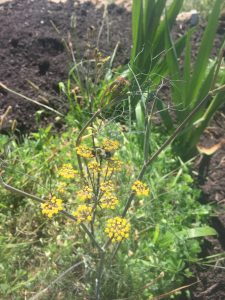Description
Bronze fennel is a perennial herb that belongs to the carrot family. It self-seeds and grows very quickly and abundantly, causing it to often be considered a weed. It has bronze-purple stalks, which can grow up to 6 feet tall. It can span 2 to 3 feet horizontally. In the summer, flat, yellow flowers bloom in clusters. Bronze fennel can attract Black Swallowtail caterpillars, butterflies, and pollinators.
Fennel can be traced back to Ancient Egypt times, and is believed to originally come from the Mediterranean. It is documented as being used by the Ancient Romans. Pheidippides supposedly carried a stalk of fennel as he ran from Marathon to Athens, in the story of the creation of a marathon run. Bronze fennel was brought to the Americas by Spanish explorers in the 17th century. Presently, it is mostly found in the United States and the United Kingdom.

Cultivation Tips
Bronze fennel grows best in a sunny area. It grows in USDA zones 5-11If planted in moist soil, it will grow to be more lush; if planted in drier soil, it will grow to be more tough. Because it self-seeds, the plant comes back each year and does not require significant maintenance. The seed-heads can be removed as they turn brown in order to prevent the self-seeding process and control excessive growth.
The seeds can be planted directly in the ground after the last frost in the spring, or they can be started inside a few weeks before. They should be placed ¼ inch into soil that is around 70 degrees. Seeds should be planted 12 to 18 inches apart.
Uses
Bronze fennel is used for many culinary purposes. Like many other types of fennel, it has a sweet licorice flavor. It tastes almost identical to bulb fennel. Bronze fennel seeds can be used in Italian meat products, such as sausage and salami. Its stalks and fronds are often used to stuff salmon or trout, as well as being chopped up and added to stew or salads.
Bronze fennel is a good source of vitamin C and vitamin B9, potassium and iron, and antioxidants.
Medicinal uses for bronze fennel include treatment for inflammatory diseases as well as reducing intestinal gas.
Friends
Thyme, Rosemary, and herbaceous perennials like verbascum ‘Clementine,’ and dark red-leaved sedums all grow well with Bronze Fennel.